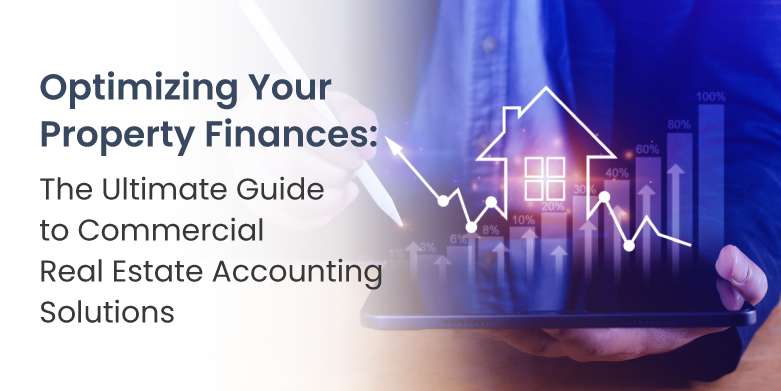
In the dynamic and intricate world of Commercial Real Estate (CRE), the role of efficient accounting cannot be overstated. Beyond mere number crunching, adept accounting in commercial real estate is pivotal for the strategic management of investments, ensuring regulatory compliance, optimizing tax positions, and seamlessly integrating innovative technologies. The complexity of transactions, which range from straightforward lease agreements to multifaceted development projects, along with the imperative to adhere to ever-evolving regulatory frameworks, places a considerable burden on businesses to maintain precise and efficient financial systems. Additionally, the necessity for tax optimization and the integration of advanced technological solutions further amplify these challenges, making it crucial for CRE stakeholders to embrace sophisticated accounting solutions.
Section 1: Understanding the Landscape
Current Trends and Statistics
The CRE sector is witnessing significant shifts influenced by global economic cycles, technological advancements, and changing investment patterns. As of the latest reports, the global CRE investment volume showcases a trend of cautious optimism amidst market volatility, with an increasing emphasis on technology adoption to enhance operational efficiency and decision-making processes. The adoption of PropTech solutions, for instance, has seen a remarkable uptick, with a reported 88% of CRE professionals agreeing that digital and technological integration is a pivotal part of their operational strategy.
Economic cycles greatly impact CRE investments and accounting practices. During periods of economic expansion, there’s a surge in property transactions and development projects, leading to complex accounting needs related to revenue recognition, lease accounting, and capitalization of expenses. Conversely, economic downturns necessitate a focus on cost management, impairment assessments, and liquidity analysis, further complicating the accounting landscape.
Challenges in CRE Accounting
The complexities inherent in CRE accounting are manifold. Lease accounting, under ASC 842 and IFRS 16, presents significant challenges in terms of recognizing lease assets and liabilities on balance sheets and requires meticulous attention to detail. Similarly, the capitalization of expenses related to property development and acquisition demands a deep understanding of accounting standards to ensure compliance and optimize financial statements.
Statistics highlight the high error rates and compliance issues faced by businesses not leveraging optimized accounting solutions. For instance, a survey indicated that nearly 40% of CRE companies report difficulties in maintaining compliance with new lease accounting standards, underscoring the need for specialized accounting software and expertise.
Section 2: Advanced Accounting Strategies
Tax Optimization
In the realm of tax optimization, CRE investors and operators can leverage several strategies to minimize tax liabilities. Cost segregation studies can accelerate depreciation deductions, enhancing cash flow in the short term. Similarly, 1031 exchanges offer a mechanism for deferring capital gains taxes when investing the proceeds from the sale of a property into another. Opportunity Zone investments also present a compelling tax incentive, allowing for the deferral and potential reduction of capital gains taxes, in addition to tax-free growth for investments held for at least ten years.
Financial Reporting and Compliance
The landscape of financial reporting and compliance is continually evolving, with ASC 842 and IFRS 16 leases representing significant shifts in how lease obligations are recognized and reported. Adhering to these standards requires a thorough understanding of the technical requirements and the implementation of robust accounting systems capable of managing the increased complexity.
Asset and Portfolio Management
Advanced accounting strategies extend beyond compliance and tax optimization to encompass asset and portfolio management. Real-time valuation models, performance metrics, and risk assessment tools, powered by accounting data, are essential for making informed management decisions. These techniques enable CRE professionals to analyze the financial performance of their investments, identify trends, and make strategic adjustments to maximize returns.
Technology Integration and Solutions
CRE-Specific Accounting Software
The real estate sector’s unique financial intricacies necessitate specialized accounting software that caters specifically to its complex requirements. Leading software solutions in the CRE space offer a suite of features designed to tackle challenges such as multi-entity management, complex lease administration, and sophisticated financial analysis tools. These platforms are engineered to handle extensive property portfolios, streamline lease accounting processes in compliance with ASC 842 and IFRS 16, and facilitate detailed financial reporting and analysis across various dimensions of the business.
For instance, software solutions like Yardi and MRI Software stand out for their comprehensive property and lease management modules, integrated financial reporting, and the ability to manage transactions across multiple entities and currencies. Such tools not only enhance accuracy but also significantly reduce the time required for financial consolidation and reporting processes.
Automation and AI
The integration of automation and artificial intelligence (AI) in CRE accounting processes represents a transformative shift, enabling unprecedented efficiency and accuracy. Automation technologies facilitate the streamlining of repetitive tasks such as transaction entries, bank reconciliations, and invoice processing. AI, on the other hand, extends this further by offering predictive analytics for market trends, tenant credit risk analysis, and automated decision-making support.
Statistics reveal substantial benefits from adopting these technologies, including efficiency gains of up to 50% in transaction processing and error reductions by over 30%. Furthermore, AI-driven analytics can enhance market trend prediction accuracy, offering CRE investors a competitive edge in identifying profitable investment opportunities.
Blockchain in CRE Accounting
Blockchain technology is gradually carving out a role in CRE accounting, promising enhanced transparency, security, and efficiency in transactions. The application of smart contracts on blockchain platforms can automate lease agreements, payments, and compliance processes, reducing the need for manual oversight and minimizing the risk of errors.
Case studies of early adopters illustrate significant benefits, including the streamlined processing of transactions, reduced reconciliation times, and enhanced security of financial data. For example, a blockchain-based platform for property sales can reduce transaction times from months to days by automating legal checks and fund transfers, demonstrating the technology’s potential to revolutionize traditional CRE transactions.
Implementing Change
Change Management Strategies
Transitioning to new accounting solutions in CRE requires a strategic approach to change management, encompassing staff training, data migration, and system integration. Effective strategies include comprehensive training programs to ensure staff are proficient in new technologies, phased data migration plans to minimize operational disruptions, and integration of new software with existing systems to ensure seamless data flow.
Addressing common resistance points involves demonstrating the tangible benefits of new technologies, providing clear communication on the changes, and involving key stakeholders in the decision-making process. Engaging employees early and offering adequate support throughout the transition can significantly mitigate resistance and foster a positive attitude towards change.
Regulatory and Compliance Considerations
Navigating regulatory changes is a critical aspect of technology adoption in CRE accounting. Organizations must ensure compliance with data protection laws, such as GDPR in Europe, and adapt to cross-border financial reporting standards when implementing new technologies. This involves conducting thorough audits of new systems to ensure they meet regulatory requirements and implementing robust data protection measures to safeguard sensitive financial information.
Cost-Benefit Analysis
Evaluating the ROI of implementing advanced accounting solutions in CRE involves a detailed cost-benefit analysis, considering factors such as cost savings from reduced manual processing, efficiency gains from automation, and improvements in compliance rates. This analysis should account for the initial investment in software and technology, ongoing operational costs, and quantifiable benefits such as time savings, error reduction, and improved decision-making capabilities.
By conducting a comprehensive cost-benefit analysis, CRE businesses can make informed decisions on technology investments, ensuring that the adoption of advanced accounting solutions translates into tangible financial and operational benefits.
Conclusion
The exploration into optimizing property finances underscores the critical nature of advanced accounting solutions in navigating the complexities of Commercial Real Estate (CRE) accounting. The evolution from understanding transactional complexities and compliance requirements to the strategic implementation of technologies like AI, blockchain, and sustainability reporting demonstrates a clear path towards enhanced efficiency and accuracy in financial management. The future of CRE accounting holds promising advancements and challenges that demand continuous adaptation and strategic foresight from CRE professionals.
Recognizing the importance of staying ahead in this dynamic environment, partnering with experts like Springbord.com becomes essential. Springbord’s comprehensive suite of services is tailored to meet the unique challenges of the CRE sector, offering cutting-edge solutions for accounting, tax planning, and compliance management. Embrace the opportunity to optimize your property finances with Springbord, positioning your portfolio for growth and stability in an ever-evolving market landscape.











